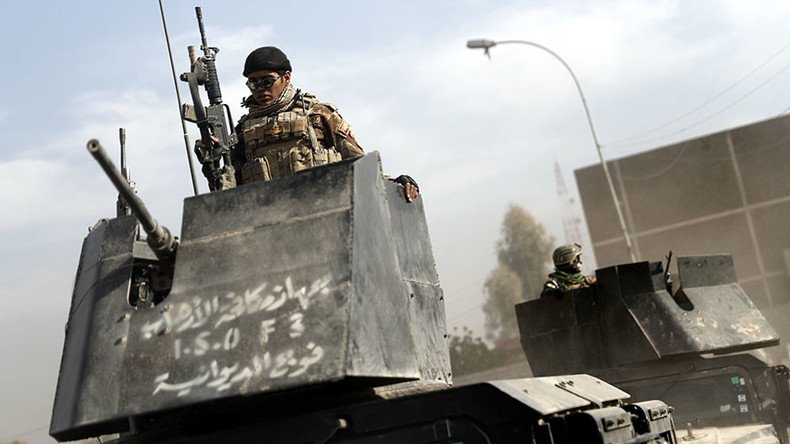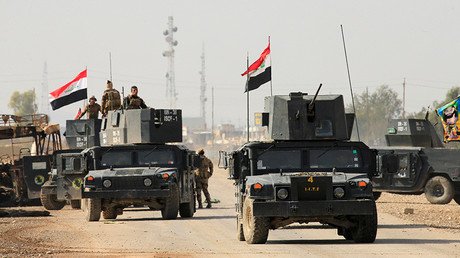The deputy chief of the US-led coalition in Iraq said outside observers need to show “patience” towards retaking Mosul, admitting there is no deadline, as ISIS militants vigorously defend it.
Major General Rupert Jones, Britain’s most senior commander in Iraq and deputy commander of the US-led coalition in the region, told journalists on Monday the offensive to retake the Islamic State-held (IS, previously ISIS/ISIL) city may not go as smoothly as planned.
The terrorist group is fighting vigorously in the besieged city, he stressed, despite “an extraordinary amount of progress” made by Iraqi troops and coalition forces, the Guardian reported. Therefore it was necessary for the Iraqi Security Forces (ISF) to “demonstrate restraint,” Major General Jones insisted.
The strength of the IS forces defending Mosul is estimated at 4,000 to 9,000 militants, including 1,000 foreign fighters. The offensive force comprises a 100,000-strong alliance of the Iraqi Army, Kurdish Peshmerga, as well as Iraqi-backed Shiite militias, Turkish expeditionary forces, and Western commandos.
“And that has been built in part on us hitting Daesh day in, day out. By the time the ISF stepped off into Mosul, we had been shaping and degrading that enemy day in, day out for months,” the British general said.
Despite numerical and firepower superiority, Gen. Jones refused to offer a timetable for the fall of Mosul, claiming that it was on schedule. He also said he expected the terrorist group to be defeated in all Iraqi towns and cities by the second half of 2017.
Jones, the youngest general in the British military, went on to say the offensive is taking time because if the forces “hard charge their way through the city,” there would be “an awful lot of civilian casualties.” He added that the troops opted for “a deliberate manner,” also “trying to minimize their own casualties.”
The remark, however, might conflict with the grim reality on the ground. Civilian casualties are only increasing, as the Mosul offensive enters its second month. While Islamic State militants use non-combatants as human shields and practice brutal executions, coalition air strikes also cost lives.
A new AP video from the Iraqi town of Erbil shows crowds of displaced persons escaping the besieged Mosul, as well as Iraqi troops evacuating the injured. Doctors in the main Erbil hospital treating trauma victims from the Mosul offensive told AP they are overflowing with casualties, both civilian and military.
In mid-November, the UK-based NGO Airwars said up to 127 civilians have been killed in coalition bombings and by ‘friendly fire’ over the month-long offensive. The report came days before a warning from the UN, which noted mounting civilian casualties are overwhelming the capacity of the government and international aid agencies.
In the embattled neighborhoods of eastern Mosul, residents are being killed by both sides and are often not sure which side to fear more. Some local residents told the International Business Times they see attacks by coalition warplanes and Iraqi Army artillery as more dangerous than Islamic State’s atrocities.
“The main threat to us was air strikes and shelling,” said a man who called himself Abu Zain.
Speaking to RT last week, Peter Maurer, President of the International Committee of the Red Cross (ICRC), said civilians in embattled Middle Eastern cities, including Mosul, are becoming less secure than soldiers. “Today’s conflicts are moving to urban areas, to cities where civilians are much more exposed to the impact of explosives, of bombardment, of artillery,” the ICRC head asserted.
According to the International Organization for Migration, more than 56,000 civilians have fled Mosul for their lives since the operation started, but a number of aid agencies said earlier that this number could jump to over a million.
Civilians in and around the city are not immune to the other perils of war. Earlier in November, Amnesty International accused Iraqi police forces of torturing and killing civilians “execution-style” on suspicion of sympathizing with IS. Baghdad blamed local residents for the crimes, saying its troops had nothing to do with the shootings.
100 beheaded bodies discovered in mass grave near Mosul – Iraqi military
Some military observers maintain the prospect of defeating Islamic State in Mosul remains clouded. “They [the US-led coalition] probably realize that the thing in Mosul is not going to be very successful,” retired US Air Force Lieutenant Colonel Karen Kwiatkowski told RT, adding that once liberated, the city may even cease to exist as the result of intense bombing.
Since the start of the offensive, top officials in Washington have admitted that retaking Mosul will bring “inevitable” suffering to civilians. “We are aware civilian lives are at risks in Mosul,” US State Department spokesman Mark Toner said in mid-October, adding that the fight for Mosul will go hand-in-hand with the “inevitable” displacement of civilians.


